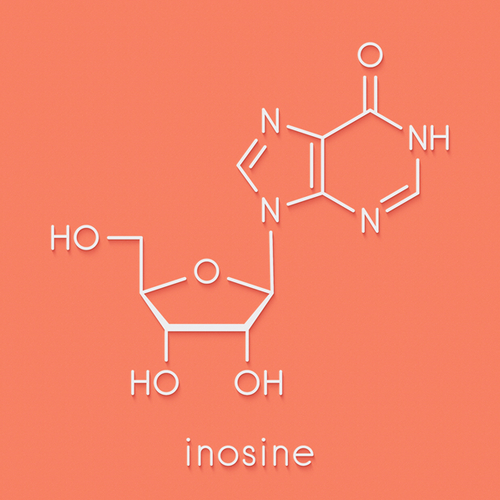
Inosine
Scientific names: 2,3-Diphosphoglycerate, 6,9-Dihydro-9-B-D-ribofuranosyl-1H-puin-6-one, 9-B-D-ribofuranosylhypoxanthine
Alternate names: Hypoxanthine Riboside, Hypoxanthosine, Inosina
Background
Inosine is a chemical that is found in RNA, which is present in all living cells. It can be made in a laboratory and is also used as medicine.
When people take inosine by mouth it is changed in the body to make a chemical called uric acid. Uric acid acts like an antioxidant and might protect cells in the brain.
People use inosine for Parkinson disease, multiple sclerosis (MS), athletic performance, and many other conditions, but there is no good scientific evidence to support these uses.
When people take inosine by mouth it is changed in the body to make a chemical called uric acid. Uric acid acts like an antioxidant and might protect cells in the brain.
People use inosine for Parkinson disease, multiple sclerosis (MS), athletic performance, and many other conditions, but there is no good scientific evidence to support these uses.
Safety Safety definitions
When taken by mouth: Inosine is possibly safe. Taking inosine can cause high levels of a chemical called uric acid in the blood and urine. This might cause kidney or bladder stones in some people.
Gout: Taking inosine might increase levels of uric acid. This might make gout worse in some people.
Special Precautions & Warnings:
Pregnancy and breast-feeding: There isn't enough reliable information to know if inosine is safe to use when pregnant or breast-feeding. Stay on the safe side and avoid use.Gout: Taking inosine might increase levels of uric acid. This might make gout worse in some people.
Effectiveness
Effective Effectiveness definitions
There is interest in using inosine for a number of purposes, but there isn't enough reliable information to say whether it might be helpful.
Dosing & administration
Inosine has most often been used by adults at a dose of 1-3 grams by mouth daily for up to 2 years. Speak with a healthcare provider to find out what dose might be best for a specific condition.
Interactions with pharmaceuticals
Medications for gout (Antigout Drugs)
Interaction Rating=Moderate Be cautious with this combination.
Inosine increases levels of uric acid. High levels of uric acid might make gout worse. Taking inosine along with antigout drugs might reduce the effects of these drugs.
Interactions with herbs & supplements
There are no known interactions with herbs and supplements.
Interactions with foods
There are no known interactions with foods.
vital.ly has licensed monographs from TRC Healthcare.
This monograph was last reviewed on 26/08/2023 10:00:00. Monographs are reviewed and/or updated multiple times per month and at least once per year.
Natural Medicines disclaims any responsibility related to medical consequences of using any medical product. Effort is made to ensure that the information contained in this monograph is accurate at the time it was published. Consumers and medical professionals who consult this monograph are cautioned that any medical or product related decision is the sole responsibility of the consumer and/or the health care professional. A legal License Agreement sets limitations on downloading, storing, or printing content from this Database. No reproduction of this monograph or any content from this Database is permitted without written permission from the publisher. It is unlawful to download, store, or distribute content from this site.




